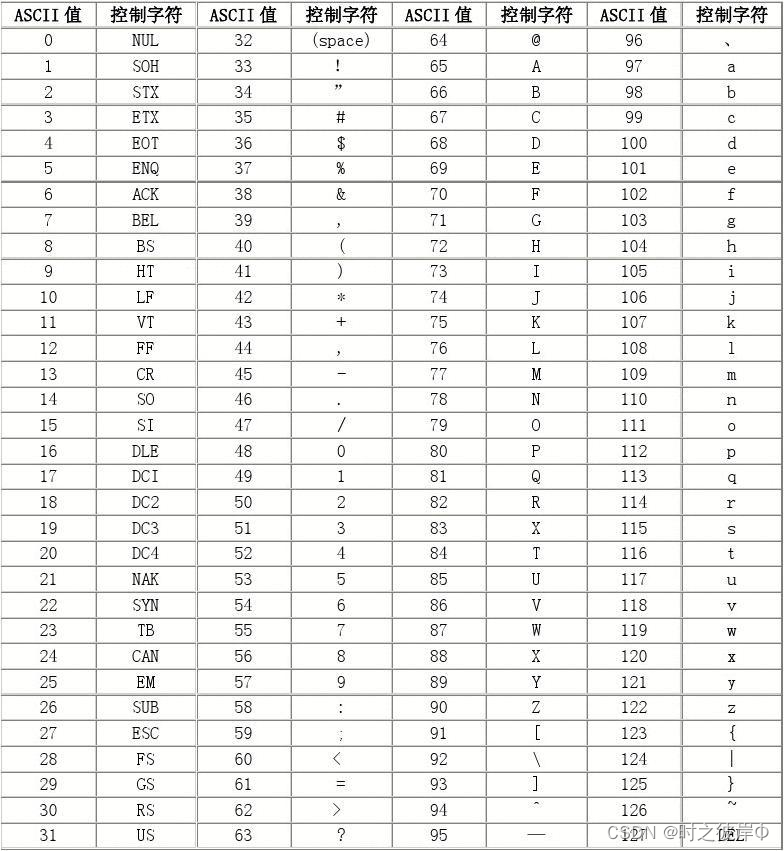C/C++ 基本数据类型的范围
发布时间:2024年01月17日
一、常见的数据类型及其范围
| 数据类型 | Size(64位) | 范围 |
| int | 4Byte | |
| unsigned int | 4Byte | |
| long | 4Byte | |
| unsigned long | 4Byte | |
| long long | 8Byte | |
| unsigned long long | 8Byte |
查询Size代码:sizeof(类型)
查询范围代码:numeric_limits<类型>::max和numeric_limits<类型>::min
#include<iostream>
#include<string>
#include <limits>
using namespace std;
int main()
{
cout << "type: \t\t" << "************size**************"<< endl;
cout << "bool: \t\t" << "所占字节数:" << sizeof(bool);
cout << "\t最大值:" << (numeric_limits<bool>::max)();
cout << "\t\t最小值:" << (numeric_limits<bool>::min)() << endl;
cout << "char: \t\t" << "所占字节数:" << sizeof(char);
cout << "\t最大值:" << (numeric_limits<char>::max)();
cout << "\t\t最小值:" << (numeric_limits<char>::min)() << endl;
cout << "signed char: \t" << "所占字节数:" << sizeof(signed char);
cout << "\t最大值:" << (numeric_limits<signed char>::max)();
cout << "\t\t最小值:" << (numeric_limits<signed char>::min)() << endl;
cout << "unsigned char: \t" << "所占字节数:" << sizeof(unsigned char);
cout << "\t最大值:" << (numeric_limits<unsigned char>::max)();
cout << "\t\t最小值:" << (numeric_limits<unsigned char>::min)() << endl;
cout << "wchar_t: \t" << "所占字节数:" << sizeof(wchar_t);
cout << "\t最大值:" << (numeric_limits<wchar_t>::max)();
cout << "\t\t最小值:" << (numeric_limits<wchar_t>::min)() << endl;
cout << "short: \t\t" << "所占字节数:" << sizeof(short);
cout << "\t最大值:" << (numeric_limits<short>::max)();
cout << "\t\t最小值:" << (numeric_limits<short>::min)() << endl;
cout << "int: \t\t" << "所占字节数:" << sizeof(int);
cout << "\t最大值:" << (numeric_limits<int>::max)();
cout << "\t最小值:" << (numeric_limits<int>::min)() << endl;
cout << "unsigned: \t" << "所占字节数:" << sizeof(unsigned);
cout << "\t最大值:" << (numeric_limits<unsigned>::max)();
cout << "\t最小值:" << (numeric_limits<unsigned>::min)() << endl;
cout << "long: \t\t" << "所占字节数:" << sizeof(long);
cout << "\t最大值:" << (numeric_limits<long>::max)();
cout << "\t最小值:" << (numeric_limits<long>::min)() << endl;
cout << "unsigned long: \t" << "所占字节数:" << sizeof(unsigned long);
cout << "\t最大值:" << (numeric_limits<unsigned long>::max)();
cout << "\t最小值:" << (numeric_limits<unsigned long>::min)() << endl;
cout << "double: \t" << "所占字节数:" << sizeof(double);
cout << "\t最大值:" << (numeric_limits<double>::max)();
cout << "\t最小值:" << (numeric_limits<double>::min)() << endl;
cout << "long double: \t" << "所占字节数:" << sizeof(long double);
cout << "\t最大值:" << (numeric_limits<long double>::max)();
cout << "\t最小值:" << (numeric_limits<long double>::min)() << endl;
cout << "float: \t\t" << "所占字节数:" << sizeof(float);
cout << "\t最大值:" << (numeric_limits<float>::max)();
cout << "\t最小值:" << (numeric_limits<float>::min)() << endl;
cout << "size_t: \t" << "所占字节数:" << sizeof(size_t);
cout << "\t最大值:" << (numeric_limits<size_t>::max)();
cout << "\t最小值:" << (numeric_limits<size_t>::min)() << endl;
cout << "string: \t" << "所占字节数:" << sizeof(string) << endl;
cout << "type: \t\t" << "************size**************"<< endl;
return 0;
}二、常用的ASCII表

文章来源:https://blog.csdn.net/qq_55038440/article/details/135660332
本文来自互联网用户投稿,该文观点仅代表作者本人,不代表本站立场。本站仅提供信息存储空间服务,不拥有所有权,不承担相关法律责任。 如若内容造成侵权/违法违规/事实不符,请联系我的编程经验分享网邮箱:chenni525@qq.com进行投诉反馈,一经查实,立即删除!
本文来自互联网用户投稿,该文观点仅代表作者本人,不代表本站立场。本站仅提供信息存储空间服务,不拥有所有权,不承担相关法律责任。 如若内容造成侵权/违法违规/事实不符,请联系我的编程经验分享网邮箱:chenni525@qq.com进行投诉反馈,一经查实,立即删除!
最新文章
- Python教程
- 深入理解 MySQL 中的 HAVING 关键字和聚合函数
- Qt之QChar编码(1)
- MyBatis入门基础篇
- 用Python脚本实现FFmpeg批量转换
- 深度解析运维工程师职业发展:技能提升、行业趋势与未来出路
- 腾讯云微服务11月产品月报 | TSE 云原生 API 网关支持 WAF 对象接入
- SLAM中的KDTree是什么,如何构建KDTree
- 我的创作纪念日
- vivado 接口、端口映射
- 4.php开发-个人博客项目&登录验证&cookie&session&验证码安全
- Google ads谷歌广告投放详细步骤与技巧
- 2024.1.23栈与队列总结篇
- Tuxera NTFS for Mac2024免费Mac读写软件下载教程
- 牛客小白月赛86 解题报告 | 珂学家 | 最大子数组和变体 + lazy线段树&动态区间树